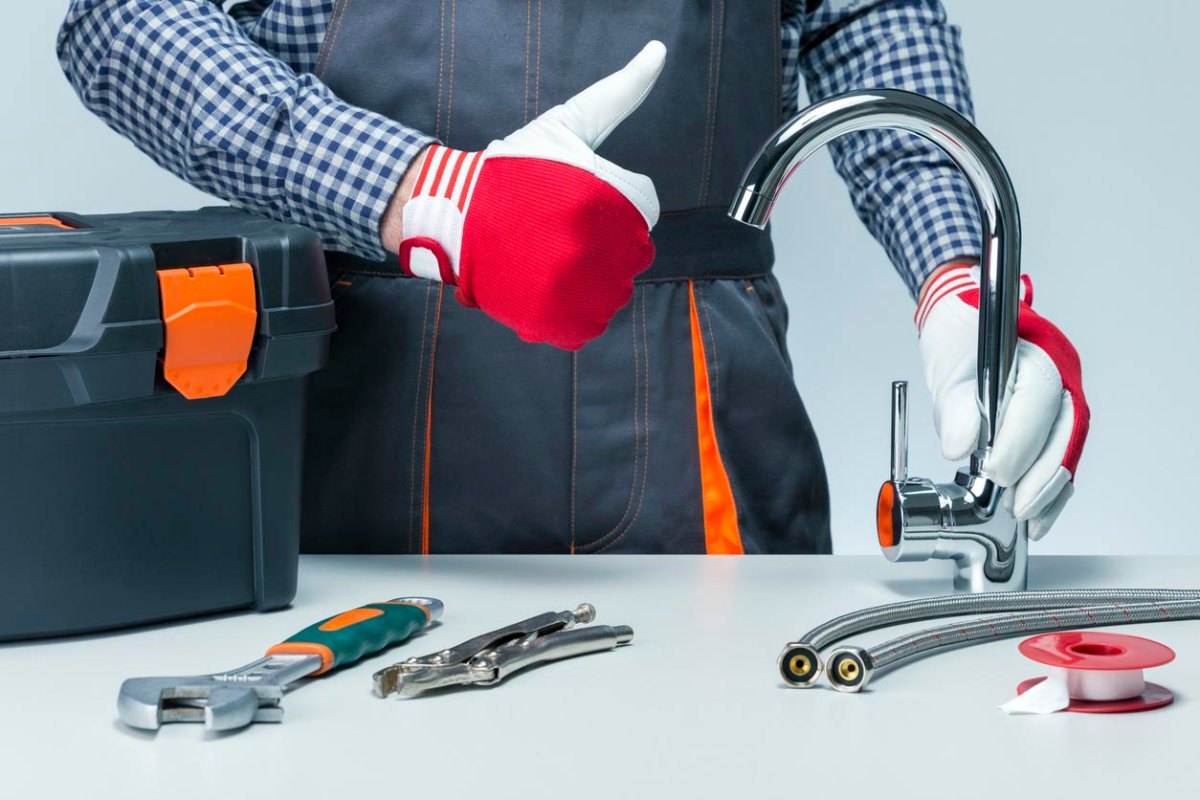

We may earn revenue from the products available on this page and participate in affiliate programs. Learn More ›
Individuals who have repair skills and a knack for home improvement might consider going into business for themselves as a handyman. Because a handyman service will always be in demand among local homeowners, going into this field can be a smart and profit-making decision for a handy individual.
However, launching a successful handyman business requires more than simply being a skilled tradesperson. As any entrepreneur can attest, it requires thorough research and planning to successfully navigate the complexities of establishing and running a business.
From understanding the market and defining a business model to navigating legal requirements and crafting a marketing strategy, each aspect plays a pivotal role in the successful launch and sustainability of a handyman business. Entrepreneurs will want to make a handyman business startup checklist—a guide to equip them with the knowledge and tools needed not only to start their business but to be able to compete with the best home services.
Before You Begin…

Before diving into the specific steps of starting a handyman business, it’s important for an entrepreneur to consider some factors that can significantly impact the journey.
For those wondering whether starting a handyman business is a good idea in the current market, the answer is a resounding “yes.” Even in challenging economic circumstances, the demand for home maintenance and repair services is often steady, as these needs are ongoing for homeowners. However, success in this field requires a business understanding, customer service skills, and a willingness to adapt to varying job requirements. An aspiring handyman will want to assess the market demand in their area, understand the competition, and identify their unique selling point (USP).
No certification is one-size-fits-all in terms of qualifications required to become a handyman. However, possessing a combination of handyman skills, experience, and, in some cases, specific types of business licenses, is essential for anyone who wants to enter the field.
The qualifications to become a handyman will vary depending on the types of services the business plans to offer and the legal requirements of the state or jurisdiction. For instance, someone who intends to provide specialized services such as electrical work or plumbing may need a professional license in these fields. Even for general handyman services, having a background in trades or construction is invaluable. Additionally, soft skills such as communication, time management, and customer service are essential for a successful business.
Tips for How to Start a Handyman Business
- Develop a comprehensive business plan that includes market analysis, service offerings, pricing strategy, and a clear marketing approach to establish a strong foundation for a handyman business.
- Obtain any necessary licenses or certifications required by the business’s state of incorporation for the specific services the business plans to offer.
- Build a robust network of suppliers and subcontractors, and invest in quality tools and equipment, to ensure efficient, reliable, and high-quality service to clients.
STEP 1: Write up a handyman business plan detailing what services you’ll offer, the business’s goals, and the costs of starting the business.
A good handyman business plan comprehensively outlines the range of services that the business intends to offer, as well as its goals and objectives to serve as a roadmap for growth and development. The business plan could include short-term aims, like establishing a client base, or long-term aspirations, such as expanding services or geographic reach. Entrepreneurs will want to include a detailed analysis of the startup costs involved in launching the business. These costs would include expenses such as tools and equipment, licensing fees, insurance, and marketing.
David Birkes, owner and general contractor of Birkes Builders in Colleyville, Texas, explains that crafting a formal business plan was “instrumental” to his company’s growth and helped with strategizing and outlining its trajectory.
“The process of compiling it allowed me to meticulously consider each aspect of the business, from market analysis and competitive strategy to financial projections and operational planning,” he says. “This level of detail not only provided invaluable clarity but also prepared us for potential challenges, a core reason why businesses fail early on. While the plan has evolved over time, its essence remains a guiding light for Birkes Builders, and I believe its continual refinement is vital for our sustained success.”
STEP 2: Review your state’s requirements for handyman business licenses and permits.
An aspiring handyman will want to thoroughly review and understand their state’s handyman business code, including any specific handyman business license and permitting requirements. The necessity for a handyman to have a license depends on the state.
In some regions, handymen are required to have a contractor’s license, especially for performing specialized tasks, such as electrical or plumbing work, or for handling projects above a certain dollar value. Other states may have more lenient regulations, offering a “handyman exemption” for smaller, less complex jobs.
Additionally, aside from state regulations, local city or county ordinances may also impose additional licensing or permit requirements. A prospective business owner will want to conduct detailed research or consult with local authorities to ensure full compliance with all legal requirements. Handymen will want to learn how to get a business license to make sure they’re operating legally within their jurisdiction.

STEP 3: Choose a business structure.
When deciding on the best business structure for a handyman business, the business owner will want to consider various factors such as liability, taxes, and administrative complexity. For many handymen, starting as a sole proprietorship is a common choice due to its simplicity and ease of setup. This structure allows for direct control over the business decisions and is relatively straightforward in terms of tax filing.
However, if the handyman is concerned about personal liability or plans to scale the business, forming a limited liability company (LLC) might be a better choice. A handyman LLC provides a separation between personal and business assets, offering protection against personal liability while still maintaining operational flexibility. Each structure has its advantages and implications for the business, so the business owner will want to weigh these options carefully, considering both current needs and future plans. Consulting with a legal or business adviser, or even with one of the best LLC services (such as LegalZoom or Northwest Registered Agent) can also provide tailored guidance to ensure the chosen structure aligns with the handyman’s business goals and legal requirements.
Before officially registering a business, the entrepreneur will want to research handyman business name ideas and make sure another company isn’t already operating under that name and structure. For this reason, many handymen incorporate their personal name into their business name (e.g., “Smith’s Handyman Services LLC”).
STEP 4: If needed, look into options for small-business funding to get your handyman business off the ground.
Several avenues for small-business funding are available to help entrepreneurs get their business off the ground, each with its own set of benefits and requirements.
Traditional bank loans are a common choice, offering lending options tailored to small businesses. Alternatively, government-backed loans, such as loans by the Small Business Administration (SBA), can provide more favorable terms and lower interest rates. For those looking for less traditional methods, crowdfunding platforms or seeking investments from friends and family can also be viable options. Another avenue for handymen is applying for grants specifically designed for small businesses or trade-specific enterprises.
It’s important for business owners to carefully assess their financial needs, including initial setup costs, tool and equipment purchases, and operating expenses, and then align these with the best funding source that suits their needs. Thorough research and a well-prepared business plan can enhance the entrepreneur’s chances of securing the necessary funding to launch and sustain a handyman business.
STEP 5: Open a business bank account to keep your personal and business finances separate.
Opening a business bank account helps to keep personal and business finances separate. This separation is essential not only for clear financial management but also for maintaining professionalism and simplifying accounting practices. A dedicated business account makes it easier to track expenses, manage invoices, and prepare for tax season, as all business transactions are consolidated in one place. It also enhances a business’s credibility with clients and suppliers, as payments are made to and from a business account rather than a personal one. Additionally, in the event of a business audit, having distinct accounts can provide business owners with a clear financial trail and demonstrate compliance with business regulations.
For handymen just starting out, choosing a bank that offers low fees and good customer service can help minimize costs and ensure a smooth banking experience. Setting up this account early in the business setup process lays a solid foundation for effective financial management and contributes to the overall organization and success of the handyman business.
STEP 6: Purchase the basic tools and equipment you need to get your business started.
Investing in the right handyman tools and equipment will help handymen deliver quality service and handle a wide range of jobs efficiently. Birkes notes that a core handyman tool kit boils down to “versatility and necessity” and recommends that entrepreneurs invest in the following basic equipment to start:
- A set of reliable screwdrivers;
- A quality drill, ideally a combination kit with a hammer drill and impact driver for a broad range of jobs;
- A sturdy ladder;
- Safety gloves;
- High-grade goggles for eye protection; and
- A first aid kit.
Other essentials include tools such as pliers, a saw, a measuring tape, and a level. Depending on the services offered, specialized tools like plumbing wrenches or electrical testers might also be necessary. However, Birkes noted that it’s wise for business owners to pace themselves when investing in specialty tools.
“It’s enticing to splurge on every shiny gadget, but … buy [tools] as certain tasks become habitual,” recommends Birkes. “Sink funds into what will frequently pay itself off. For example, if you find yourself constantly doing tile work, it’s time to pick up that reliable tile saw.”

STEP 7: Set pricing for your handyman services.
Setting the right pricing for handyman services impacts the profitability and competitiveness of the business. Most handymen charge an hourly rate, which can vary widely based on factors such as geographic location, the complexity of services offered, and the handyman’s experience level.
The average self-employed handyman hourly rate will depend on several factors, including the handyman’s geographic location and whether they have any specialized skills. The Bureau of Labor Statistics (BLS) reports that general maintenance and repair workers earn an average of $44,980 per year or $21.62 per hour. This salary can increase with experience, a strong client base, and efficient business management.
When setting prices, handymen will want to consider all of their business operating costs, including tools, transportation, insurance, and marketing, to ensure that the pricing structure supports sustainable business growth and profitability.
Business owners will also want to conduct market research to understand the general rates in their area and to set a competitive yet profitable price point. To do this, Shlomo Cherniak, owner of Cherniak Home Services, a handyman company located in Baltimore, Maryland, advises that handymen consider factors such as the type of service(s) they plan to provide, the complexity of the project, the materials required, and the level of expertise needed. He also recommends that business owners reach out to other professionals in the industry, join trade associations, or consult industry publications to gather information on prevailing rates.
“Setting rates that are too low may undervalue your services, while setting rates that are too high may deter potential customers,” Cherniak explains. “Finding the right balance is crucial for success in the home improvement industry.”
Birkes adds that standing out based on quality and value rather than just price is crucial.
“To implement [value-based pricing], one must deeply understand the client’s needs and how our services generate improvements in their living spaces that push beyond mere renovations,” he says. “This involves tailored designs, high-quality materials, and skillful craft. We conduct thorough market research, consider the value of our design-build approach, and ensure our prices reflect the sophistication and customized experience we offer.”
STEP 8: Get small-business insurance to help protect your business financially from liability.
Securing coverage from one of the best handyman insurance companies (such as NEXT Insurance or Thimble) is a critical step for handymen, as it provides financial protection from various forms of liability. In the realm of handyman services, the question of whether a handyman needs insurance is straightforward: It is essential. Self-employed handyman insurance safeguards the business against accidents, property damage, and potential lawsuits that could arise during the course of the work. This protection is not just a precaution; it’s a vital aspect of maintaining a sustainable and reputable business.
Business owners will want to consider different types of insurance, such as general liability insurance, professional liability insurance, and workers’ compensation (if the handyman hires employees). This coverage ensures that in the event of an unforeseen incident, the handyman’s business assets and personal finances are not at risk. Moreover, having proper handyman business insurance often enhances the credibility of the business in the eyes of clients, signaling professionalism and responsibility.
STEP 9: Create a service contract for each customer to sign.
A handyman contract establishes clear expectations and responsibilities for both parties. This document will ideally outline the specifics of the job, including the services to be performed, the timeline for completion, cost estimates, payment terms, and any guarantees or warranties offered. This contract serves as a legal agreement that protects both the handyman and the client, ensuring a mutual understanding of the work scope and conditions. It also provides a reference point for both the handyman and the customer in case of any disputes or misunderstandings regarding the job.
Additionally, having a standardized contract template adds a level of professionalism to the business and streamlines the process for future projects. Handymen will want to consider legal counsel when drafting this contract to ensure that all terms are clear, fair, and compliant with local laws and regulations. By implementing a contract, handymen can foster trust with their clients and safeguard their business from potential legal complications.

STEP 10: Come up with a marketing plan to start putting your business in front of potential customers.
Effective handyman marketing needs to encompass various strategies tailored to the target audience and the unique selling points of the business. A well-rounded marketing plan that combines both digital and traditional methods can effectively promote the business and help attract and retain clients in a competitive market.
Creating a professional website and maintaining an active presence on social media platforms can significantly enhance the business’s online visibility and attract a broader customer base. Additionally, a website with informational content and helpful information is more likely to appear in search results when potential clients in the area search “handyman near me.”
Another way for handymen to attract new customers is for them to sign up for handyman job listing sites and home service apps such as Angi, HomeAdvisor, TaskRabbit, Thumbtack, or Handy. These services can complement these digital marketing efforts and further enhance a new business’s reach and visibility. Handyman business owners can research the top lead-generation websites by reviewing comparisons and reviews.
Traditional marketing methods, such as distributing handyman business cards and flyers in the local community, will also enhance visibility. These tangible materials can be left in local hardware stores, community centers, or with satisfied customers, providing a personal touch that often resonates with the local clientele. Business owners can also network with local contractors, real estate agents, and property managers to further open up referral opportunities.
STEP 11: Invest in a business software program to help you run the handyman business more efficiently.
Modern business software programs offer a range of tools that streamline various aspects of business operations, from scheduling and job tracking to invoicing and customer relationship management. With handyman software, such as Housecall Pro or Jobber, business owners can easily keep track of appointments, manage work orders, and ensure timely communication with clients. Additionally, features like invoicing and payment processing integrated into the software can simplify the financial aspects of the business, making it easier to track income, expenses, and profitability.
- Want to know more? Check out the BobVila.com Jobber review and see which service we like more: Housecall Pro vs. Jobber.
Handyman software also aids in maintaining a professional image, as it allows for prompt and organized interactions with clients. This software can be instrumental for growing businesses in that it helps to manage an increasing workload and client base efficiently. By leveraging the capabilities of specialized business software, handymen can focus more on their core services and less on administrative tasks, leading to improved productivity and customer satisfaction.
These guidelines serve as a valuable resource, offering practical advice and actionable strategies to navigate the complexities of starting and running a handyman business. By following these steps, new and aspiring handymen can ensure their business not only meets legal and professional standards but also thrives in a competitive market, ultimately leading to sustainable growth and customer satisfaction. The journey of starting a handyman business, while challenging, can be deeply rewarding when approached with dedication and the right preparation.
